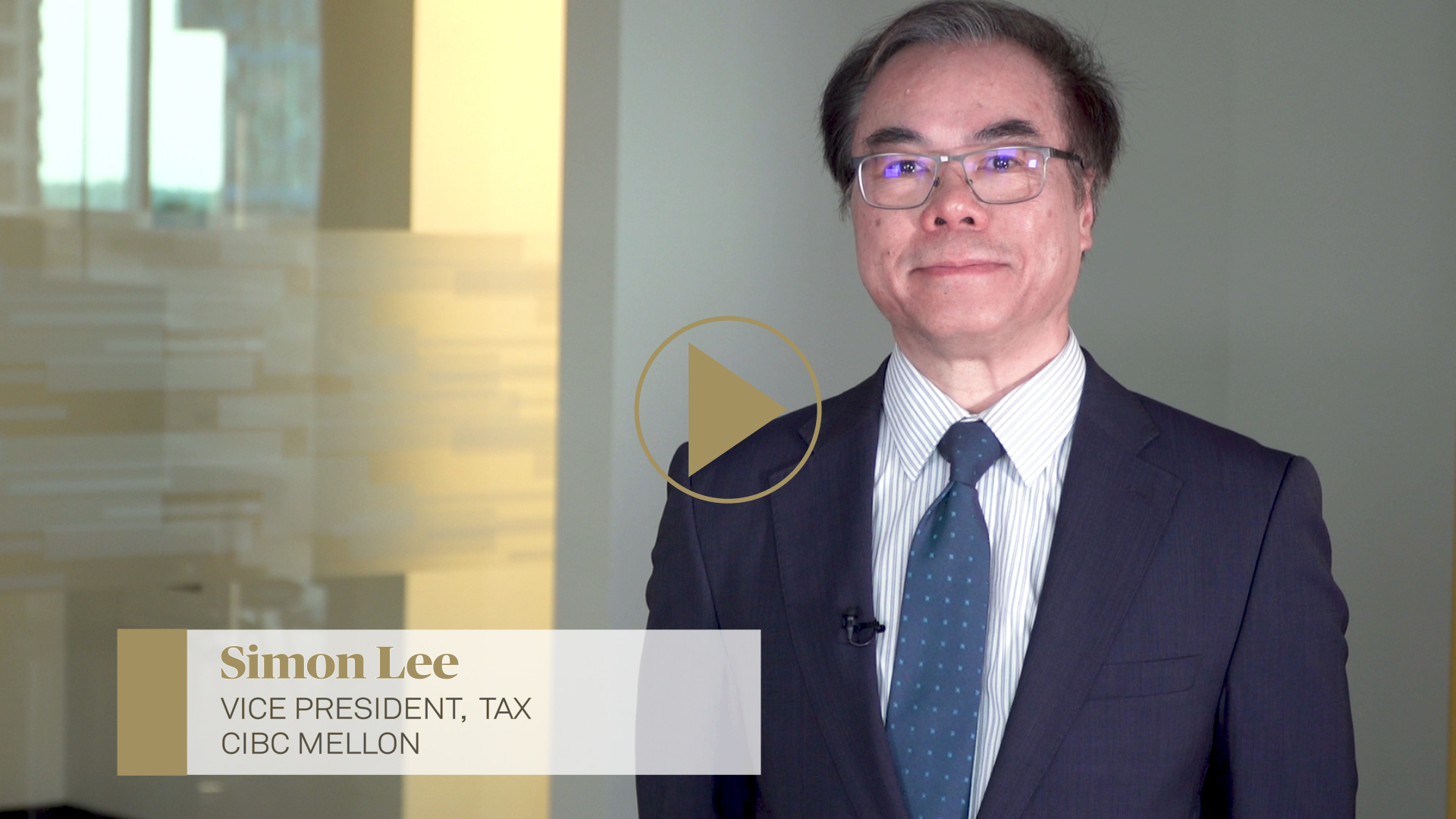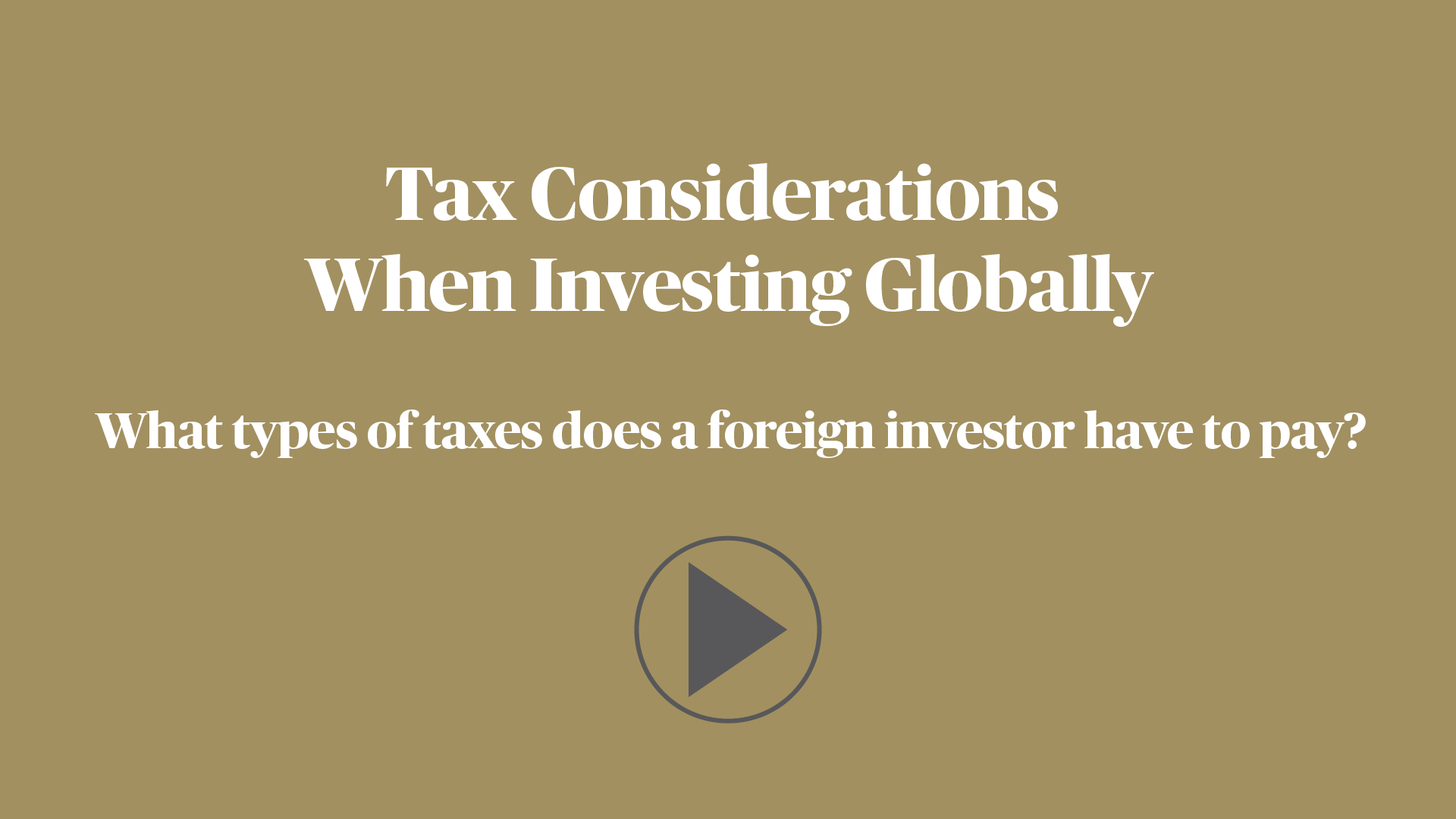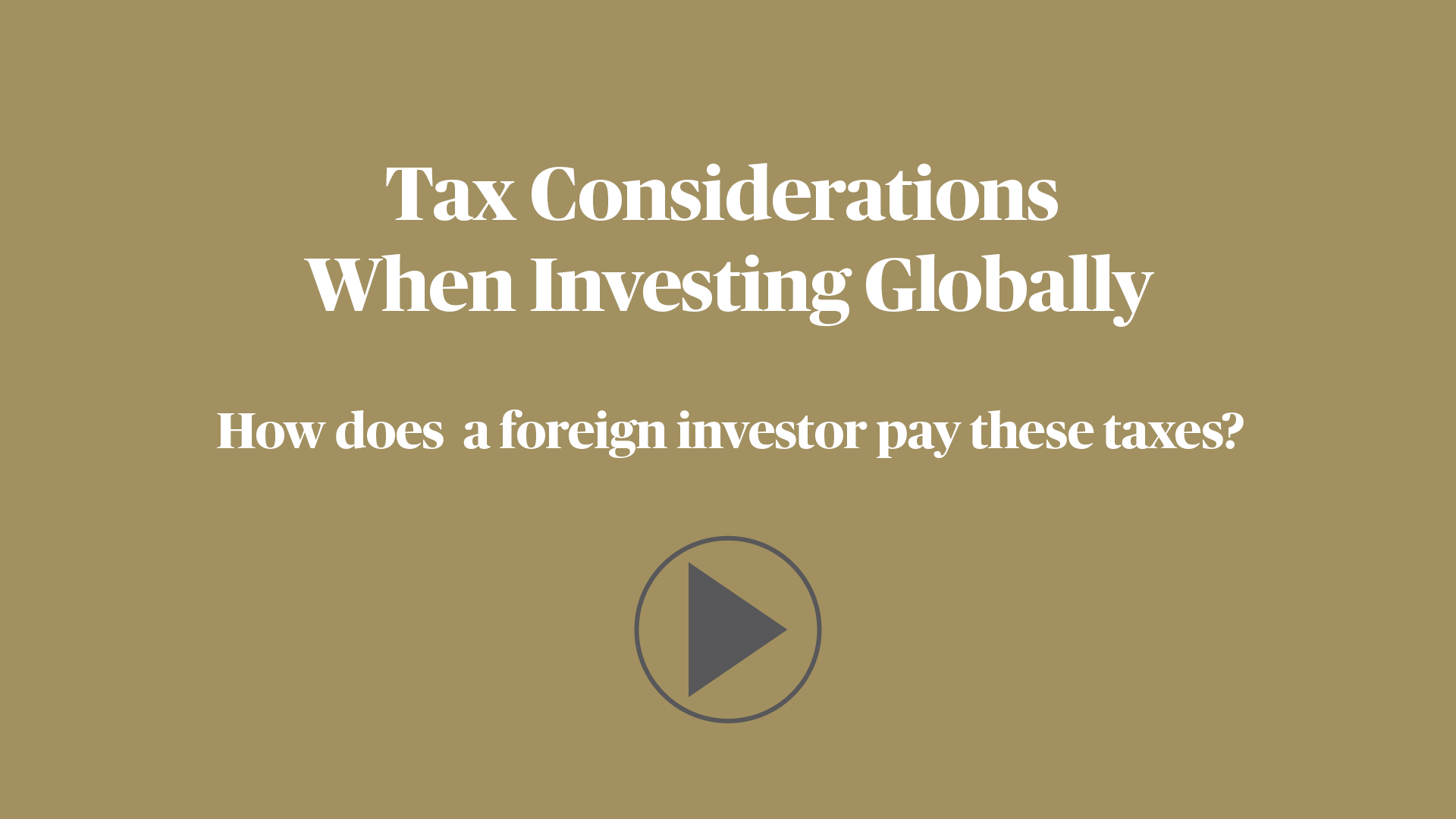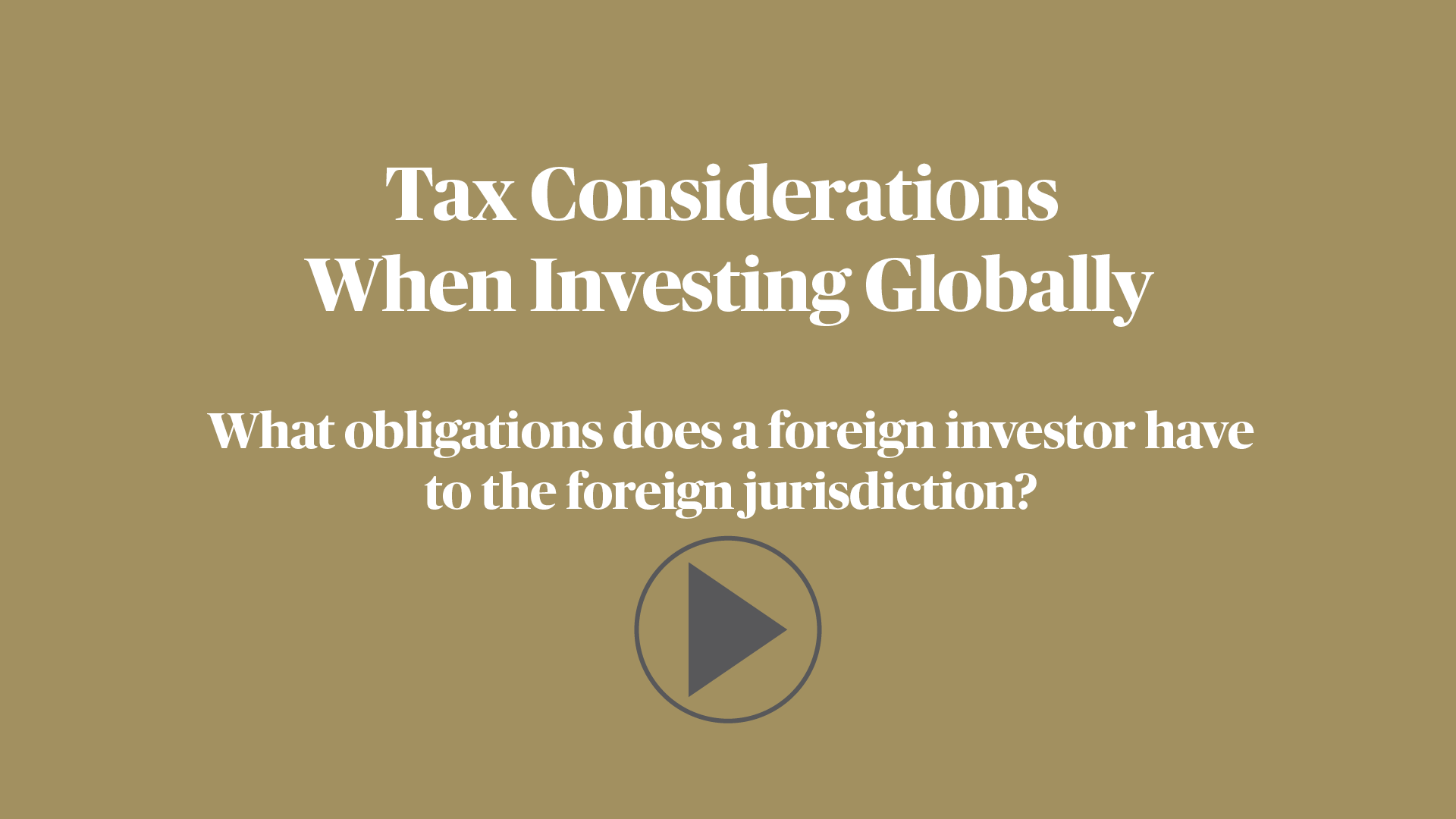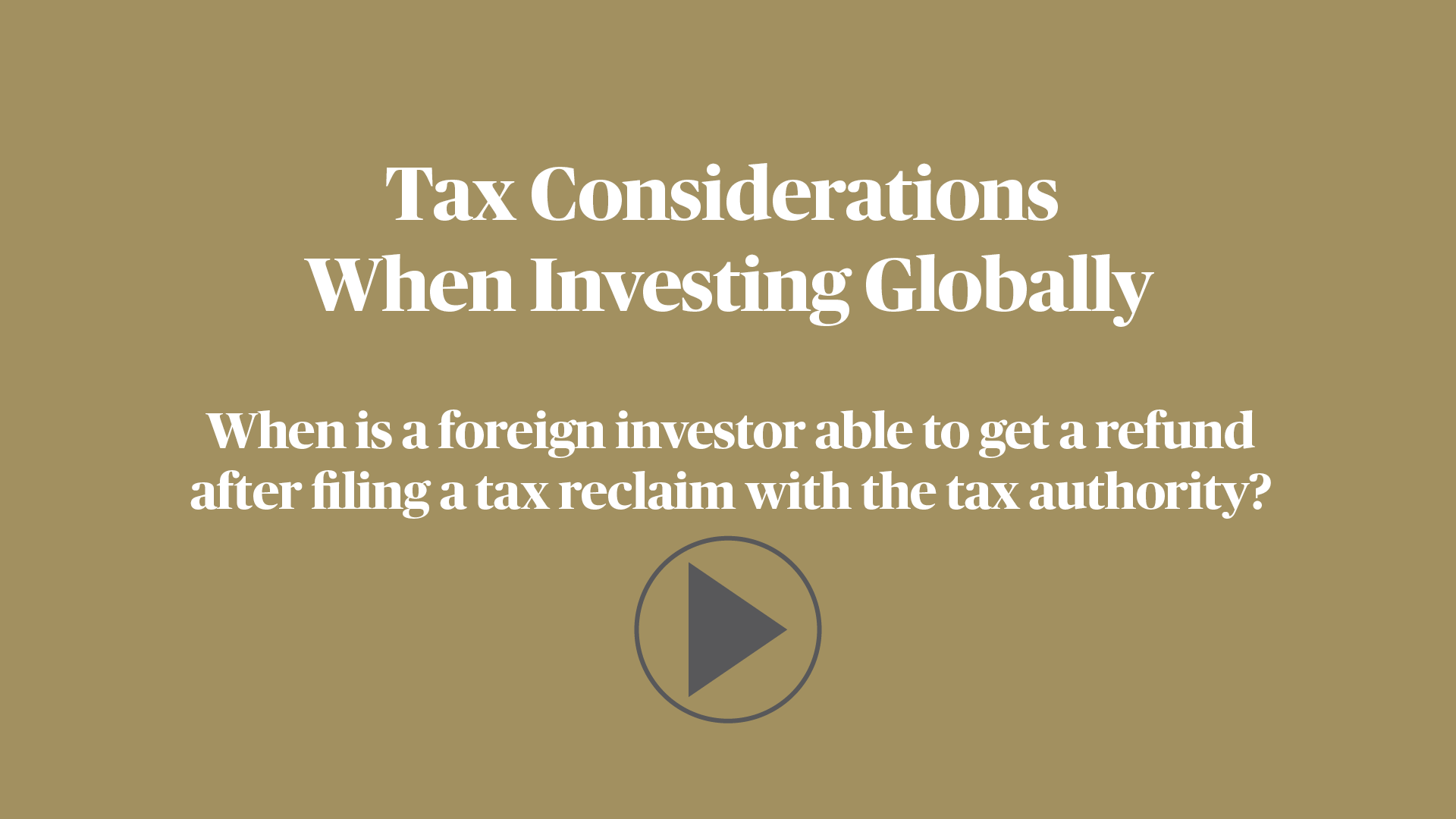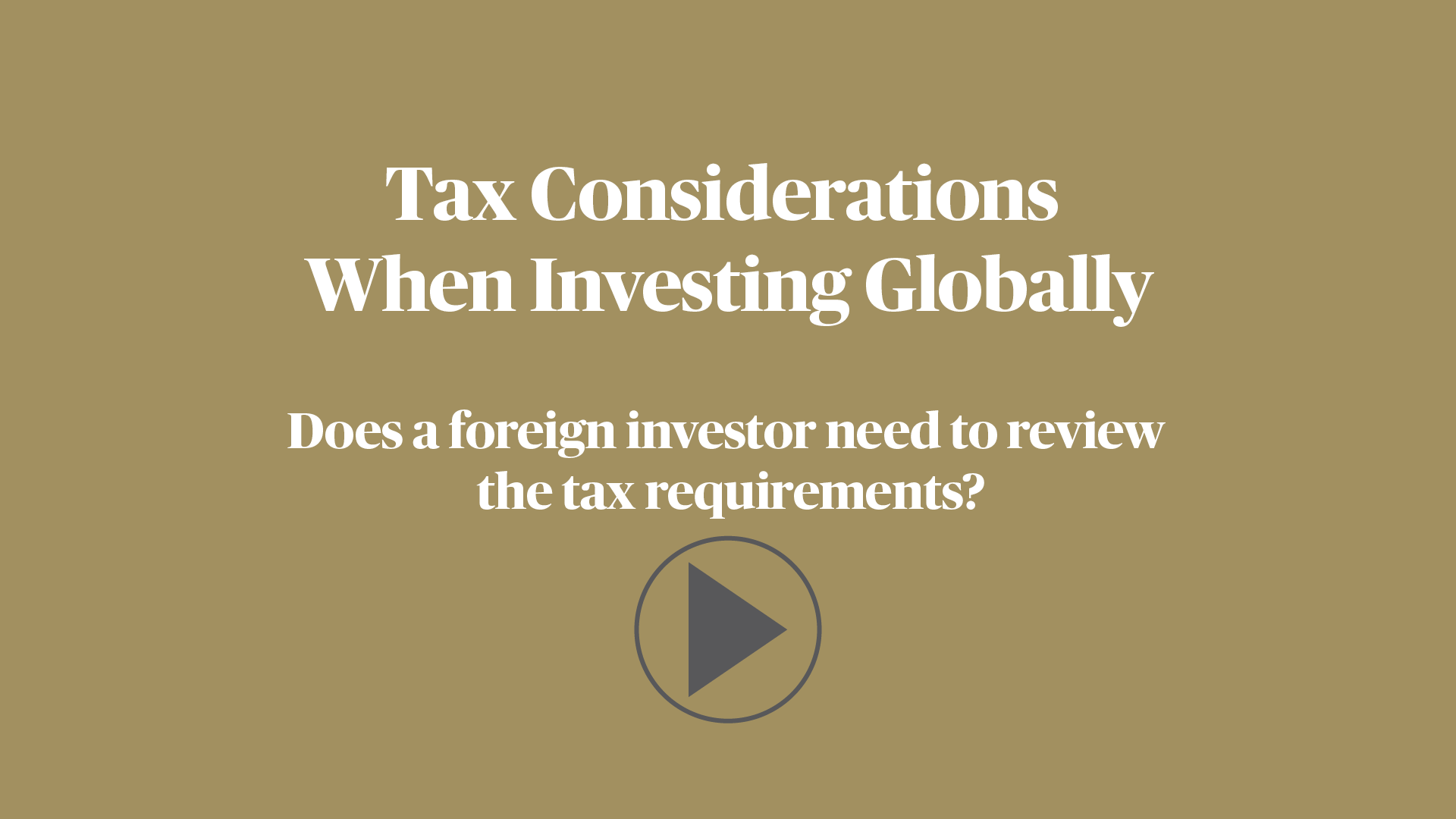
Five Tax Considerations for Global Institutional Investors
Five Tax Considerations for Global Institutional Investors
By Simon Lee
September 2019
Five Tax Considerations for Global Institutional Investors
As global institutional investors navigate international markets in pursuit of their investment goals, the pursuit of appropriate tax treatment and the effective execution of tax filing, reclaim and other activities is a key aspect of investment operations. After all, investors are keen to avoid leaving money on the table, and to ensure they meet the necessary requirements from local authorities as they invest into target markets.
The complexity and diversity of global tax regimes bring a wide array of requirements and obligations. Global investors should consider a number of aspects to take into consideration, such as foreign taxes, liquidity principles, political risks, currency risks, transaction costs, and management fees. Different markets have different tax codes and regulations that require compliance. Investing in foreign markets has the potential to substantially complicate an investor’s tax position - leaving them to incur additional tax bills if they do not understand the tax requirements or their obligations.
We encourage global investors to consider these five key questions as they invest around the world.
1. What types of taxes does a foreign investor have to pay?
Many institutional investors solely pay attention to withholding tax on income that they need to pay. However, different markets have unique types of taxes that foreign investors are required to pay. Common types of taxes may include non-resident withholding tax on investment income, capital gains tax on capital gains realized on the sale of stocks, and financial transaction tax on a particular financial transaction.
As an example, the U.S. Treasury Department and the U.S. Internal Revenue Service have issued proposed regulations with guidance on how to apply a new withholding tax of 10 percent under U.S. Internal Revenue Code (IRC) Section 1446(f) on a transfer by a non-U.S. person of an interest in a partnership that carries on a trade or business in the U.S. or otherwise realizes income effectively connected with such a trade or business. This is a new type of tax as it is a tax on proceeds instead of on income and could be considerably larger.
2. How does a foreign investor pay these taxes to the foreign tax authority?
Many institutional investors assume that their custodian will handle all withholding taxes on income that they are required to pay. While custodians are capable of withholding and remitting withholding taxes on their foreign income to the foreign tax authorities, they need to be mindful of how different types of taxes may be dealt with. For instance, the Taiwanese government requires foreign institutional investors to appoint a Taiwanese tax agent to ensure that all taxes due on investment income are settled in accordance with Taiwan’s tax code and regulations. In this case, this is not the type of tax that a custodian can handle for a client.
3. What obligations does a foreign investor have to the foreign jurisdiction?
Some countries like Canada require a non-resident to pay non-resident withholding tax on the Canadian source investment income they earn. The tax is withheld and remitted by the payer such as a custodian or broker. This tax is the final tax obligation of the investor to the foreign jurisdiction.
However, depending on the type of assets and the type of payments received by a foreign investor, they may have other obligations. For instance, ownership of U.S. real estate through a partnership involves distinct U.S. tax consequence. The partners are taxed directly on their share of the partnership’s income annually. Each foreign partner of the partnership is required to file a U.S. income tax return.
Therefore, knowing their tax obligations is very important to avoid any penalties and interest as a result of non-compliance with the tax requirements.
4. When is a foreign investor able to get a refund after filing a tax reclaim with the tax authority?
Eligibility criteria for tax reclaim procedures vary from market to market. Some jurisdictions refund taxes very quickly, others take a long time and require a great deal of supporting documents for the tax authorities to review.
From a refund perspective, when a foreign investor invests directly in a foreign security, it is generally easier for them to get a refund as long as they can provide the tax authorities with proper documentation showing that they are the beneficial owner of the income and are eligible for treaty benefits.
However, if they invest indirectly through an investment fund, it may take them a longer time to get a refund. This is because some tax authorities have more complicated procedures in place for foreign investment funds trying to claim treaty benefits on withholding tax. For example, the Swiss Tax Authorities require foreign investment funds to provide with them detailed information and supporting documents for each underlying investor before refunding any taxes. Due to the complexity of the process, foreign investors would not be able to get a refund within a short period of time after providing documents to the investment fund in which they have invested.
The more supporting documents required, the longer it takes to get a tax refund. This impacts the return on investment that the investor may want to achieve.
5. Does a foreign investor need to review the tax requirements?
It is very important for foreign investors to perform a periodic review of the tax requirements with their tax advisors, custodian and other stakeholders as the existing tax rules and requirements keep changing.
In addition, new tax regulations and requirements are released by the tax authorities in different jurisdictions periodically that may impact both existing investors and new investors.
For example, Canada’s Department of Finance recently announced that the Multilateral Convention to Implement Tax Treaty Related Measures to Prevent Base Erosion and Profit Shifting (also known as the Multilateral Instrument, or MLI) sponsored by the Organisation for Economic Co-operation and Development (OECD), has been enacted into law in Canada.
The MLI will allow Canada to modify its existing tax treaties to include measures developed under the OECD/G20 Base Erosion and Profit Shifting (BEPS) project without having to individually renegotiate those treaties, in turn permitting the measures to be implemented in a more synchronized and efficient manner. The MLI measures are intended to enhance Canada's ability to address treaty abuse and improve the dispute resolution process under tax treaties.
Furthermore, doing research and keeping up to date on the tax requirements will help a foreign investor be aware of both challenges and opportunities to help them make informed decisions.
While investing in a foreign jurisdiction has benefits, tax implications are important factors that institutional investors need to consider and monitor. Institutional investors need to be aware of the tax requirements of foreign countries, especially when searching for the highest yield.
Staying informed and connected
For many institutional investors, a key aspect of global investment is navigating the different tax rules and regulatory requirements that exist across foreign markets. Tax rules vary widely between jurisdictions, and are subject to change at any time. A strong provider should be expected to keep well apprised of global regulatory and industry changes as they relate to the local market.
Clients should work with their custodians and other service providers as they monitor global and domestic tax trends. Providers should be engaged in industry discussions with local tax authorities in order to raise important questions for institutional investors to consider in the near future.
While clients should consult their own tax, legal and compliance advisors for specific guidance, as a custodian, CIBC Mellon encourages open communication with clients, and seeks to provide relevant information and context. By engaging with clients regarding their directions and expectations, we are better positioned to support our clients as they work to achieve appropriate tax treatment for their global investments.
This article is provided for general information purposes only and CIBC Mellon and its affiliates make no representations or warranties as to its accuracy or completeness, nor do any of them take any responsibility for third parties to which reference may be made. This article should not be regarded as legal, accounting, investment, financial or other professional advice nor is it intended for such use.
About CIBC Mellon
CIBC Mellon is a Canadian company exclusively focused on the investment servicing needs of Canadian institutional investors and international institutional investors into Canada. Founded in 1996, CIBC Mellon is 50-50 jointly owned by The Bank of New York Mellon (BNY) and Canadian Imperial Bank of Commerce (CIBC). CIBC Mellon's investment servicing solutions for institutions and corporations are provided in close collaboration with our parent companies, and include custody, multicurrency accounting, fund administration, recordkeeping, pension services, exchange-traded fund services, securities lending services, foreign exchange processing and settlement, and treasury services.
As at December 31, 2025, CIBC Mellon had more than C$3.4 trillion of assets under administration on behalf of banks, pension funds, investment funds, corporations, governments, insurance companies, foreign insurance trusts, foundations and global financial institutions whose clients invest in Canada. CIBC Mellon is part of the BNY network, which as at December 31, 2025 had US$59.3 trillion in assets under custody and/or administration. CIBC Mellon is a licensed user of the CIBC trade-mark and certain BNY trade-marks, and is the corporate brand of CIBC Mellon Trust Company.
